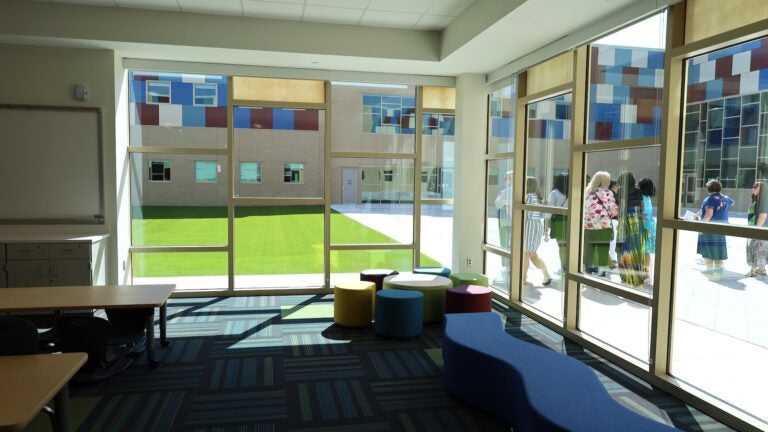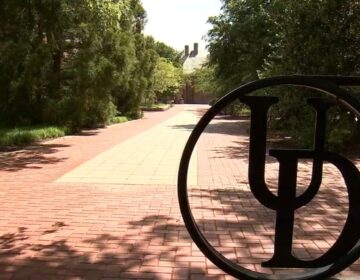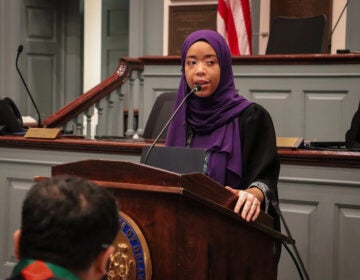‘Not going to wait’: Advocates question whether Delaware is acting fast enough to fix its failing education funding system
Commission members are already saying they may need more time. The earliest the recommendations could be included in the state budget is fiscal year 2027.
Listen 0:59
Community members tour Maurice Pritchett Sr. Academy, the first new Wilmington school in 50 years. (Sarah Mueller/WHYY)
From Philly and the Pa. suburbs to South Jersey and Delaware, what would you like WHYY News to cover? Let us know!
This story was supported by a statehouse coverage grant from the Corporation for Public Broadcasting.
A new commission created to overhaul Delaware’s public education funding formula may already lack the political will to make big changes. The Public Education Funding Commission started meeting last month.
Task force members have already started pushing back on the timeline for issuing final recommendations, frustrating at least one education advocate who previously sued the state. American Civil Liberties Union of Delaware Legal Director Dwayne Bensing said officials must act urgently to fix a failing system, including adding hundreds of millions of dollars more in funding.
Delaware is required to invest more money in public education due to a legal settlement with the ACLU of Delaware and others. A report released last year by the American Institutes for Research (AIR) as a result of the lawsuit showed Delaware was underfunding high-needs students by $600 million to $1 billion. Public education advocates sued the state in 2018, alleging it was underfunding disadvantaged public school students. The parties settled in 2020.
Bensing said he questioned the value of another committee instead of lawmakers directing more money to schools. He said the AIR report already lists sweeping recommendations, including distributing resources according to student needs, implementing a weighted student funding formula, increasing overall state investment and improving transparency.
“This is the Delaware way, which has been the Delaware delay,” he said. “We have had year after year of workforce, task force, WEIC [Wilmington Education Improvement Commission], [Wilmington Education Advisory Committee], Redding Consortium and now this commission to sit there and stare at our belly buttons, apparently, because what we haven’t had is legislative action addressing the dire need of our disadvantaged students in the state.”
Public Education Funding Commission
The 31-member commission includes lawmakers, executive branch officials, teachers, principals, school administrators and community advocates. It’s met twice so far.
It was created by state lawmakers earlier this year with a mandate to make its first recommendations on public education funding by October 2025. But after pushback by commissioners, state Sen. Laura Sturgeon, who also chairs the Senate Education Committee, indicated she would rewrite the resolution to give the group more time if needed. A new resolution reauthorizing its existence must pass again next year.
“I’m putting in July 2026 for final recommendations, in case we don’t have everything figured out by October 2025 with the hope that we are ready with final recommendations by 2025,” she said.
Submitting its first recommendations by October 2025 would mean they could be funded in the fiscal year 2027 budget. Pushing to July 2026 would delay possible funding until the FY 2028 budget.
Taylor Hawk, a commissioner and director of legislative and political strategy for the Delaware State Education Association, disputes Bensing’s view of the commission. She said it has been given a huge task and is acting with urgency.
“I know that the people around the table are really committed to moving as quickly as possible,” she said. “Because we really are in an unprecedented situation of vast staffing shortages and there’s a real necessity to make sure that we’re providing the resources that schools and districts need.”
‘Remodel or rebuild’
Delaware’s funding formula dates back to the 1940s. It’s unit-based, which means instead of a set amount per pupil, there’s a yearly count of students where the number of children in each building is converted into units. Some want to change the formula to per-pupil based, where the money follows the student.
Bensing said the unit-based formula lacks transparency and only school administrators — such as chief financial officers — like and understand it.
“It blocks out parents. It blocks out advocates,” he said. “It blocks out just the core question of how many taxpayer dollars are going to each individual student in each individual school district.”
Tammy Croce, one of the commissioners and executive director of the Delaware Association of School Administrators, did not respond to a request for an interview.
Mike Griffith, a senior researcher with the Learning Policy Institute, a nonpartisan education policy think tank, is helping guide the commission through the decision-making process. He told the group at the September meeting it needed to decide in November whether to “remodel or rebuild” to keep on the schedule prescribed in the resolution.
“I don’t want to go too far with the housing analogy, but … do you just want to put fresh paint, fix the roof,” Griffith said. “Do you want to do some basic changes to the current model? Do you want to do some moderate, larger changes? Or do you want to make some major changes?”
Bensing said he was once neutral on whether the unit funding system could be more equitable, but not anymore.
“All these people who are talking about ‘We want to see where the dollars are spent and how many dollars are spent on XYZ,’ they need to get in line to back a system that is per-pupil funded because the unit system is always going to hide and obscure how much our state is spending on each of our districts,” he said. “I don’t know how you can reconcile that we want transparency and accountability by continuing with the unit funding system.”
But some commissioners said they don’t yet have enough information to make that decision.
“I think each of us represent a constituent group and to have a two-hour conversation on the 14th about this topic and then expect a vote at the November board meeting is unrealistic,” said Kevin Carson, superintendent of the Sussex County Vocational Technical School District.
Commissioners may not make that decision at all. Sturgeon attempted to administer an informal anonymous poll on the issue during the Oct. 14 Zoom meeting. When technical issues interfered, she asked commissioners to raise their hands. But some members expressed concern about going on the record. Sturgeon said she plans to email the poll to commissioners, the results of which may not become public.
“Historically, we have been very divided in Delaware between two camps,” she said. “The two camps are finally at a point where they’re willing to talk to each other and work out some type of compromise. But there’s still some distrust.”
Sturgeon said instead of a binary choice of rebuild or remodel, there is movement toward a remodel choice, which would be a Delaware hybrid model. She said people who want this option are afraid of people like Bensing, who are calling for the state to adopt a per-pupil funding structure. She said that’s why she’s hesitant to be more transparent about commissioners’ thinking.
“I’m trying to avoid people digging deeper into their trenches. There have been groups entrenched in the past who feel very strongly about education reform and funding reform that are finally beginning to realize, ‘Okay, we’re not going to get everything we want,’” she said. “There [are] other groups that feel differently that are also powerful and have valid points of view.”
DSEA’s Hawk said she is also not convinced it’s a binary choice.
“I think that there are some strengths of the current system, but I think that there are significant improvements that need to be made,” she said. “In order to make sure that every student, especially our low income and English Language Learners, have the supports that they need and also that our districts have the resources they need.”
Bensing said the AIR already has the data for how much more money is needed for low-income students, special education students and English Language Learners.
“I’m not going to wait for years to pass by, for folks to sit here and have the same debates that we’ve been having for years that evade the fundamental issue,” he said. “Which is that our system is underfunded by at least $600 million.”
A newly elected governor could influence how the commission moves forward next year. Democratic candidate Matt Meyer promised he would implement AIR recommendations, such as increased student funding per pupil, a weighted student formula and more transparency. Republican candidate Mike Ramone said the funding mechanisms need to be reconfigured because they are “broken” during a recent debate and advocated for school vouchers for students attending failing schools.

Get daily updates from WHYY News!
WHYY is your source for fact-based, in-depth journalism and information. As a nonprofit organization, we rely on financial support from readers like you. Please give today.








